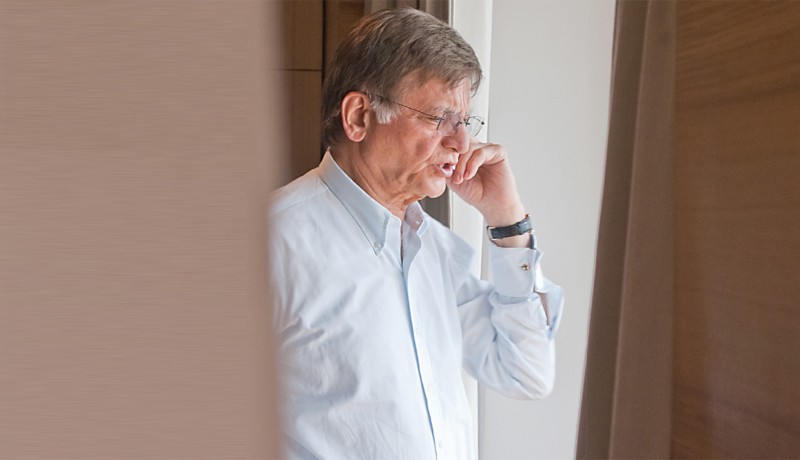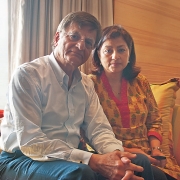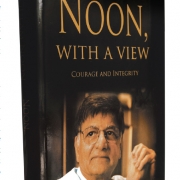
People

From working in his family’s sweetshop to becoming a member of the British peerage, Gulam Noon has written himself a life driven by extraordinary self-belief and ambition. Radhika Raje meets him in the city where the first chapter of his story was penned
As titles go, it’s a rather intimidating one: Lord Gulam Noon of St John’s Wood. But the man himself is anything but. In a crisp blue shirt, shirtsleeves rolled up, he greets us affably, even a little apologetically, in his suite on the 24th floor of the Taj Land’s End in Bandra—we are early and he needs to wrap up a meeting. Perched on a chair while his guests occupy the elegant sofas strewn across the room, he is in his element, switching effortlessly from English to Hindi and back, witty and wry, seamlessly including us in the banter. A flurry of goodbyes and it is our turn.
Against the backdrop of the Arabian Sea, a magnificent vista that would dwarf a lesser man, the 75 year-old turns his attention to us with an almost boyish earnestness and intensity as he recounts the highlights of his journey from the by-lanes of Mumbai to the rarefied environs of London’s St James Park (his office is a stone’s throw from Buckingham Palace) and the corridors of Westminster. After growing his family-run sweetshop into a thriving sweets and savouries business, he moved to the UK to set up a packaged foods business that struck gold, earning him the epithet ‘Curry King’. He had better titles in store: a knighthood in 2002, followed by his appointment to the House of Lords in January 2001—Sir Noon became Lord Noon.
To his friends—and wife Mohini Kent—though he is just ‘Noon’, a man who straddles the very distinct worlds of the UK and India with a savoir faire that belies his early years of struggle; a man who keeps returning to his beloved Mumbai, the city that fuelled the fire of his ambition, despite the trauma of being stranded in the Taj during the terror attack on 26 November 2008; a man who airs his views on extremism, religion, immigration and education with forthrightness and candour; a man who doesn’t forget a favour or a friend. “Noon makes time for everybody even if he doesn’t have enough of it to spare,” says Mohini, her voice tinged with concern as she fusses with his hair in preparation for our photo shoot. He wouldn’t have it any other way. “People love me and I love them,” he says. “It’s a great feeling.”
IN HIS OWN WORDS
It’s always special to be back in Mumbai. There are so many memories of my younger days. And I still have family in Bandra. I feel instantly at home whenever I return because I remain connected to everything going on in the country. I read Indian newspapers, watch Indian TV channels and follow Indian politics. Of course, more than anything, I am connected to India by the food my company [Noon Products] makes.
My journey with food started in this city. I began to work in my family’s sweet shop, Royal Sweets, at the age of 14. My father died very early, leaving behind a large family, three brothers, three sisters and my mother, all living in a small house. We used to lay out our mattresses on the floor in a row that extended to the door of the washroom. That’s when the fire of ambition began to burn strong; the urge to build my own big house. Although I loved my mother dearly, I couldn’t wait to move out of that house. And I did; first establishing my own business in Mumbai and then making the move to the UK.
The Americans weren’t ready for the concept of packaged Indian food—they still aren’t. In 1979, I went to the US to explore the possibility of setting up my business there. I found that people weren’t really cooking at home. They would go to Chinese, Vietnamese and Korean restaurants but were not very familiar with Indian food. I tried to sell them frozen Indian food but it didn’t take off. So I decided to try my luck in the UK—the technology was good and the demand even better. There was a whole generation of young Indians studying and working there who didn’t want to cook but wanted the kind of food their mother would make. Over the years, we have come to cater to the British palate too and ventured into European markets like Germany, France, Italy and Switzerland. We supply everywhere in Europe.
Asians in the UK are no longer limited to corner shops. From the 1960s to the 1980s, if you flew to London, you would see Pakistanis, Bangladeshis and Indians all over Heathrow Airport cleaning the carpets, the toilets. My heart would sink when I saw it. Now, corner shops and cleaning jobs have been left to new immigrants and Asians have moved up to industries, offices, even hotels. Many of them are serving in government, have assumed political office. This is a tremendous evolution. When the first generation of Indians went to the UK in the 1940s and ’50s, they would share small rooms with other immigrants.
One man would go for a shift in the morning and the other would occupy his bed till it was time for his night shift. Then, people got their families and started creating ghettos. Unfortunately, despite how far we have come as a community, many of us continue to live in ghettos without accepting the culture and traditions of the UK. That’s why the country has such strict immigration laws now. We have abused their system for too long.
I have established 14 factories in the UK and never once had to bribe anyone. That’s what I admire so much about the country. It is a level playing field; if you have a concept that offers value for money and are brave enough to deliver on it, you will succeed, no matter who you are. Who you know is irrelevant. Unfortunately, corruption has been a part of India since Independence. It was always swept under the carpet; now the carpet has swollen, which is why the protests have emerged. Today, not a single important government document can be made in India without corruption. It’s the entrepreneurs like the Tatas, Ambanis and other industrialists who have built the country; I question the role of the government and politicians. In the UK, the government is much more responsive. If a common man wants to meet a local politician, it’s so easy. I remember one of our local MPs who would buy milk from the corner shop and walk back home with it every day. Everybody on the road would talk to him and he would hear them out. There, whether it is the House of Commons or the House of Lords, they understand that it’s the public paying their salary.
I have never experienced racism as a Muslim. But it also depends on how you live your life. The Prophet said, “Be loyal to the country in which you live.” I follow that dictum. I do have many Muslim friends but I also have a lot of Hindu friends. I have prayed at a temple. When the House of Lords gathers for a session, it begins with a prayer. I pray in my own language and I pray whatever I want. No one can question that. Every Muslim cannot be considered as a terrorist. These terrorists have no religion. Their only goal is to terrorise people.
I was in the Taj in Mumbai during the 26/11 attack and escaped unscathed. I was in my suite with a few people when the attack took place. We were to dine below but my brother had brought food for us. We remained holed up in that room. Everybody kept saying, ‘This is our 9/11.’ It was one’s worst nightmare. I kept consoling everyone saying, ‘Whatever has to happen will happen. If you allow these terrorists to get into your head, they have won.’ We live in a dangerous world but if God wants to save you, no terrorist can kill you.
I admire how America tackles these terrorists. Why is there a delay in punishing Kasab? He is being provided biryani and korma. I wouldn’t be surprised if his accomplices hijack an airplane and ask for his release; he will be released then. Why wait till that day? The Americans not only captured Bin Laden but finished him off and gave him a proper burial with a Muslim preacher. I think what they did was splendid; they respected the religion and the community. That was the right thing to do. Somebody was arguing with me about how Bin Laden should have been given full judicial process; I was furious. Did he give judicial process to people that were killed on 9/11?
Only education can save us from extremism. It is the strongest currency in the world. As a Muslim, education was lacking in my community for years. Although things are changing now, the pace is slower than I would like. Religion can enhance our lives but it cannot become a substitute for education. I believe any problem a community has begins with its priest class. You don’t need a middleman between the Almighty and his follower. You should have a direct connection to your god. But priests act as middlemen and influence your thinking. Every community has this problem; it’s just the degree that differs. Once, in Delhi, a lady was crying out of joy in front of her priest, praising him because her child had graduated. I was amazed! The child graduated because of his ability and the support of his parents; the priest had nothing to do with it. This sort of ignorance can be removed only by education.
It takes very little to make a large difference. We must never forget our sense of humanity. My close friend in Bombay, who recently passed away, was an ordinary working-class person. He had two daughters and three grandchildren. In spite of that, he brought up a girl from the nearby slums like his own daughter; he educated her, got her married, helped her to buy a small flat. He helped only one child but it will have an impact on generations to come. I follow the same principle with my employees. In 1994, my factory caught fire; it was a very difficult time.
But I told my accountants to continue the wages of my employees until there was no money left in the bank. They too offered me their support wholeheartedly; conservative Punjabi women who would normally keep their distance would come and embrace me, assure me they were praying for me. Providentially, I was able to acquire another site close to mine and we were up and running exactly 10 weeks later.
I will never let my employees down. Noon Products became part of Kerry Foods, a large Irish conglomerate, in 2005, but I retain the post of chairman and act as an ambassador for the company. I cannot imagine leaving my employees after they stood by me in such difficult times. Kerry Foods had approached me to buy my company but I came to an understanding with the CEO and sold the company. Rather than stripping the assets of Noon Products, I wanted to take it forward. It’s unbelievable but there are at least 1,200 Indians working in Noon Products. Both my daughters have also worked with me.
My hospital in Rajasthan is another way to pay it forward. In 2008, I opened the doors to Noon Hospital and Research Centre in Bhawani Mandi, my hometown. I moved to Mumbai as a child but this town is an integral part of my roots. I’ve built a modern, fully equipped hospital here, dedicated to my mother. Every person who steps into the hospital is guaranteed treatment. If anybody cannot afford it, they are treated free. My doctors have taken up the challenge to make the entire district cataract-free. We have also started mobile clinics. I visit the hospital every year. And even when I am in London, I am in constant touch with everyone there. If my people don’t call me, I call and speak to them. I believe in communication.
I love cricket. On a Sunday, not even an army of horses can keep me home. Noon Products has a cricket team and we have won many trophies in club cricket. I play with them from time to time and I manage to score a few runs! People sometimes ask me if I need a runner when I play; I assure them that I have my two legs to run with. I was a weightlifter in my younger days and would go to the gymnasium in Mumbai. My passion for cricket began in those days. I used to leave home early, at 7.30 am, and play cricket in Azad Maidan [in Mumbai] before eventually reaching school; my mother never knew! I missed my younger sister’s engagement; it was on a Sunday. I remember the time I was registering as a member of a club; the form had a line for religion and I wrote ‘cricket’. They asked me to change it so I put Islam in brackets.
My mother never understood my love for cricket. I once told her that if I had enough money, I would go and meet the 3 Ws of the West Indies cricket team: Everton Weekes, Frank Worrell and Clyde Walcott. My mother would laugh and tell me the West Indies was a million miles away. But when I had really earned enough, I made that trip. I went with my children, grandchildren, sons-in-law, nephews and brothers to Barbados for the World Cup in 2008. Two of my heroes had passed away but I still wanted to see the place where they were buried and offer my respects. It was a dream and I made it come true.
Everyone should have fire in their belly. Never give up on dreams—or life. Things will keep happening; you need to enjoy the good, and face the bad with all your reserves of strength. You will eventually prevail and come out stronger, renewed. Your age is irrelevant to this process. I believe I am never too old to learn, to work. People ask me why I don’t retire; I tell them that if I retire so early, I will drive my wife nuts and die early!
Mohini keeps life real for me. We married in 1998. She has been a philosopher and guide; I discuss everything with her—except business. She is not a businesswoman; she is a creative person and very down-to-earth and grounded. I have learnt many things from her, and hopefully taught her a few things too. For instance, I recently introduced her to Dabanng; I’ve seen the film far too many times, although I am generally a Hollywood fan. So is Mohini, but I made her sit down and watch Munni badnaam hui! It was fun.
Photos: Jit Ray Featured in Harmony — Celebrate Age Magazine December 2011
you may also like to read
-
For the love of Sanskrit
During her 60s, if you had told Sushila A that she would be securing a doctorate in Sanskrit in the….
-
Style sensation
Meet Instagram star Moon Lin Cocking a snook at ageism, this nonagenarian Taiwanese woman is slaying street fashion like….
-
Beauty and her beast
Meet Instagram star Linda Rodin Most beauty and style influencers on Instagram hope to launch their beauty line someday…..
-
Cooking up a storm!
Meet Instagram star Shanthi Ramachandran In today’s web-fuelled world, you can now get recipes for your favourite dishes at….









